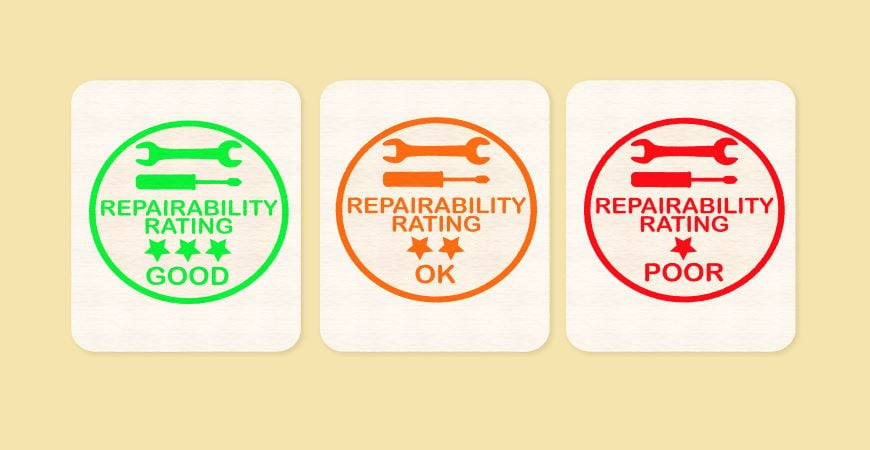International Repair Day: get Repair Scores right to guide consumer choices

Products that break down earlier than expected are a frustrating and expensive problem for consumers who must either pay for a costly repair or buy a replacement. A major survey by Euroconsumers’ members in Belgium, Italy, Portugal, Spain and consumer groups in France found a massive 67% of household appliances are thrown away because they broke down.
The environmental costs are huge. The world has a major problem with waste, including e-waste from electronic devices and appliances, the UN’s 2020 global e-waste monitor estimates that the world throws away over 53.6 million metric tonnes of often highly toxic e-waste each year. There is also an added strain on resources and carbon costs from producing yet more devices that might themselves fail too soon.
Repair scores can build the repair habit
Trying to end this destructive and wasteful cycle has become an imperative for governments racing towards climate and biodiversity goals, and for consumers wanting to save financial and planetary resources.
But shifting consumer expectations and manufacturer behaviour is difficult and will take time – we are steeped in a throwaway society and so concerted efforts are needed all across the system.
Euroconsumers Belgian member Test Achats has long been committed to developing a culture of repairable and durable consumer products. They have identified a significant information imbalance between consumers and manufacturers about the lifespan of their products. Having clear and reliable information about the lifespan of a product and how easily it can be repaired could help on the demand side as consumers make purchases or seek a fix.
In the fight against the throwaway society, we need the best quality information on product repairability.
Well-designed repairability indexes are one way to bridge this information gap. They provide a consumer-facing score for products based on: information, ease of disassembly, availability of spare parts, their price and other product-specific criteria. After a roll out in France, they are being considered in other jurisdictions.
Belgian government proposal for a Repair Score Index
The Belgian government is the latest to propose such a tool in the form of new laws based on the French model to bring in repairability and lifetime indexes which will be available with products at point of purchase.
Test Achats / Test Aankoop have welcomed the concept of the law but are concerned that in its current form it won’t deliver what is needed. Their extensive experience of repair issues on the ground, and knowledge of the shortcomings of the French index make them skeptical that directly copying it is the best approach. These concerns are shared by BEUC who also want to see much better coordination across the EU for the rules to have maximum impact.
Test Achats Repair Score learning from PROMPT
Starting in 2016, their web platform Too Rap Kapot (www.terapkapot.be) enabled consumers to report products that had broken down too soon. It became one of the first crowd-sourced datasets of the types of products causing the most problems.
This platform was extended to six other countries (Germany, France, Italy, the Netherlands, Portugal and Spain) as part of the EU Horizon 2020 PROMPT (Premature Obsolescence Multi-Stakeholder Product Testing programme) project, building up a strong evidence base and vital insight into premature obsolescence and repairability.
The project has also uncovered key consumer perspectives on repairing products. It found that high costs deter people from seeking a fix, finding it cheaper to buy a new appliance rather than repair it. It also found techniques and practices that make repairing impossible: such as a lack of replaceable parts, and physically locking down products so they can’t be opened up and fixed without damaging the whole product.
To assist consumers and repair centres Test Achats have also launched a handy repair guide for a range of popular products which was developed through the Share Repair project.
Recommendations for a strong Repair Score or Index
Test Achats would like to see improvements to the methodology and presentation of the French Index, and their suggestions are backed up by research from French consumer organisation QFC-Que Choisir. Currently, the way the French index score is calculated can lead to misleadingly high scores.
This has occurred because each criterion has the same weight in the final score – this which allows manufacturers to compensate for crucial shortcomings by achieving high scores on less important criteria.
For example, the iPhone 12 achieves a strong score of 6/10 but this does not reflect the actual complexity of repairing it. Critical repair criteria such as the availability of spare parts get low scores are masked by less significant criteria like information on software updates and the existence of a contact centre which get a maximum score.
The same thing is found in the methodology used to define the criteria for disassembly (a key part of the repairability journey) which doesn’t give adequate weighting to the most important elements.
All steps are equally weighted which means simple actions like unscrewing a part have the same weight as much more complex tasks like ungluing something. This again feeds into a final score which might not meet consumer expectations.
“The methodology that sits behind a repair score is critical. The market is full of unclear or misleading repair information which is of no use to consumers.
A strong product repair score should reverse this – therefore it is crucial we get the methodology right, so the end score is relevant and helpful for consumers”
Tom Thysen, Product Repairability Expert, Test Achats
Leaving aside the criteria, there are also worries about how the scores are verified. The French system relies only on a manufacturer’s declaration and no external verification. Market surveillance authorities must monitor the accuracy of the information and strong sanctions would discourage misreporting.
Euroconsumers are keen to see consumer facing tools rolled out quickly to help them make the best decisions they can when buying products. Authorities should not ignore the flaws of the current French system, instead they can draw on the extensive practical and technical experience of consumer organizations like Test Achats to build the best possible indices and develop a repair economy that is built to last.


The PROMPT project has received funding from the European Union’s Horizon 2020 research and innovation programme under grant agreement No 820331. Find out more at: https://prompt-project.eu/

